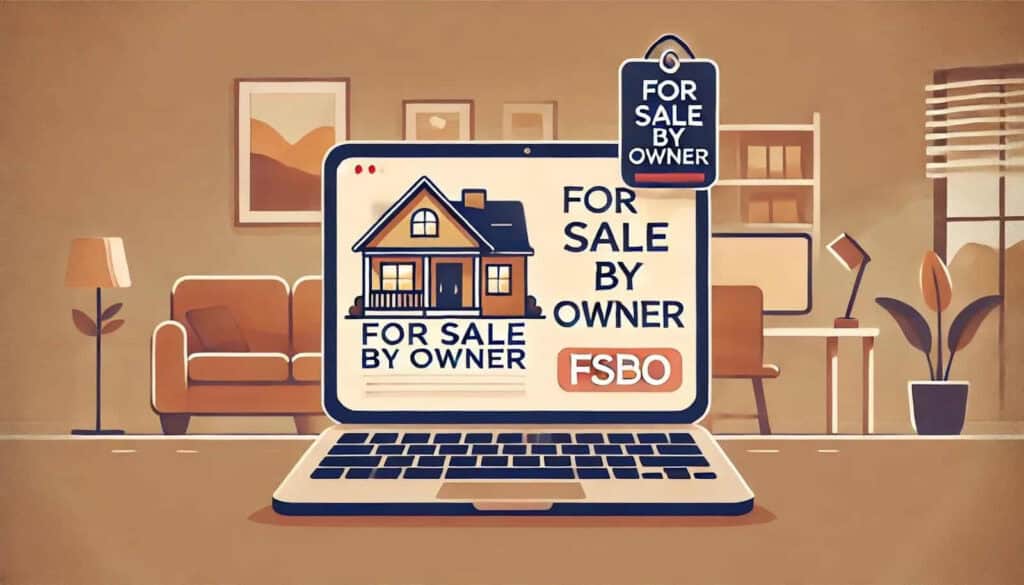![How to Sell a House Without a Realtor [2025 Guide] 1](https://www.listingspark.com/wp-content/uploads/2025/03/image-3-1024x559.jpg)
How to Sell a House Without a Realtor [2025 Guide]
Selling your home without a realtor can save you 2–3% in commission fees but requires careful preparation and execution. Key steps include accurate pricing through comparative market analysis, professional marketing and photography, proper legal documentation, and skilled negotiation. Success depends on your time availability, market knowledge, and comfort with the sales process.
- You’ll handle all responsibilities typically managed by listing agents
- Average FSBO savings range from $6,000-$18,000, depending on home value
- 6% of home sales were FSBO in 2024, down from historical highs
- Professional support platforms can bridge the gap between full-service agents and going completely solo
Selling a home represents one of the largest financial transactions most people will ever make, and doing it without a realtor adds another layer of responsibility and opportunity. While skipping the agent can save you thousands in commission fees, it also means you’ll be in charge of pricing, marketing, negotiating, and handling legal paperwork.
Selling your home without a realtor, commonly known as For Sale By Owner (FSBO), can be a rewarding endeavor offering significant savings. According to the National Association of Realtors, FSBO sales accounted for just 6% of home sales, but those who succeed often keep substantially more money in their pockets. However, going solo requires a comprehensive understanding of the process, meticulous preparation, and adherence to legal requirements.
This guide provides a detailed roadmap showing how to sell a house without a realtor, ensuring you cover all essential steps to avoid common pitfalls while maximizing your financial return.
Should You Sell Your House Without a Realtor?
Before diving into the how-to process, assess whether FSBO is right for your situation. The decision to sell a house by owner isn’t suitable for everyone, and honest self-assessment can save you time, money, and stress.
When FSBO Makes Sense
You’re an Ideal FSBO Candidate If:
- You have substantial time availability – Managing showings, inquiries, and paperwork can become a full-time responsibility
- You already have a buyer lined up – About 66% of FSBO sellers know the buyer of their home, indicating that selling to a relative, friend, or neighbor is often a main reason for choosing FSBO
- You’re in a strong seller’s market – Hot markets with low inventory give you more negotiating power and faster sales
- You’ve sold homes before – Previous experience with real estate transactions reduces your learning curve
- You’re comfortable with negotiation – Direct buyer interaction requires confidence in discussing terms and handling pushback
When You Should Consider Professional Help
FSBO May Not Be Right If:
- You need to sell quickly – The average FSBO takes longer to sell than agent-assisted sales
- Your market is highly competitive – Buyer’s markets require sophisticated marketing and pricing strategies
- You’re uncomfortable with legal complexity – Real estate transactions involve substantial legal documentation and potential liability
- You lack market knowledge – Pricing errors can cost you more than agent commissions would
- You’re emotionally attached – Objective decision-making becomes difficult when personal memories influence business choices
1. How Do You Prepare Your Home for a Successful FSBO Sale?
Before you list your home, ensure it presents in the best possible condition. As a homeowner selling independently, you must handle all responsibilities from research to marketing and negotiations to attract more buyers and potentially receive higher offers.
Assessing and Enhancing Property Condition
Begin by conducting a thorough evaluation of your home’s condition. Address necessary repairs, focusing on issues that could deter potential buyers or become negotiation points later. According to industry experts, strategic improvements can significantly impact your return on investment.
Essential preparation tasks include:
- Deep cleaning every room – First impressions form within seconds of entry
- Decluttering and depersonalizing – Allow buyers to envision themselves in the space
- Addressing obvious repairs – Fix leaky faucets, squeaky doors, and cosmetic damage
- Enhancing curb appeal – Fresh landscaping and exterior touch-ups create positive initial reactions
- Neutralizing paint colors – Bold personal choices can alienate potential buyers
Professional Photography and Virtual Tours
High-quality images serve as the primary draw for online listings, where most buyers begin their search. Professional photography can cost a few hundred dollars but positively impact your home’s perceived value and showing requests.
If hiring a professional isn’t feasible, follow these DIY photography tips:
- Use natural lighting whenever possible
- Capture wide-angle shots to showcase room size
- Stage each room to highlight functionality
- Take photos during optimal lighting conditions (late morning or early afternoon)
- Include exterior shots from multiple angles
Virtual tours can enhance your listing’s appeal, allowing buyers to explore your home remotely before scheduling in-person visits. Many smartphone apps now offer easy virtual tour creation, making this technology accessible to FSBO sellers.
2. How Do You Price Your Home Competitively Without an Agent?
Determining an accurate listing price is essential to attracting buyers and ensuring a smooth transaction. When you’re learning how to sell a house without a realtor, pricing becomes one of your most critical responsibilities. A well-priced home generates interest without leaving money on the table, while poor pricing can result in extended market time or financial loss.
Conducting a Comprehensive Comparative Market Analysis (CMA)
Research recent sales of similar properties in your area to determine a competitive price. While online platforms provide basic valuation tools, comprehensive comparative market analysis requires deeper investigation.
Your CMA should include:
- Recently sold properties (within 3–6 months) with similar square footage, bedrooms, and bathrooms
- Currently active listings to understand your competition
- Expired or withdrawn listings to identify pricing mistakes to avoid
- Neighborhood trends, including average days on market and price-per-square-foot data
- Seasonal market patterns that might affect timing strategies
Understanding Current Market Conditions
Stay informed about local real estate trends, including average days on market and seasonal demand fluctuations. Market conditions impact pricing strategy. Seller’s markets allow for more aggressive pricing, while buyer’s markets require competitive positioning.
Psychological Pricing Strategies
Consider listing at strategic price points that maximize search visibility. Many buyers use search filters with cutoffs at round numbers, so a home priced at $299,900 appears in searches for homes under $300,000, while a $300,000 listing may not.
Homes priced slightly below market comparables often generate more interest and can lead to multiple offers, potentially driving the final sale price above the asking price.
3. What’s the Best Way to Market Your FSBO Property?
Effective marketing ensures your home reaches the widest audience possible. A strong strategy helps you stand out from the competition while maximizing exposure to qualified buyers.
Getting MLS Access Without a Realtor
The Multiple Listing Service (MLS) remains the most important marketing tool in real estate, with over 90% of home sales involving MLS exposure. When you sell your house by owner, gaining access to this vital platform typically requires working with a flat-fee MLS service, as getting your home listed on the MLS without a realtor requires professional broker assistance.
Flat-fee MLS services provide:
- MLS listing that syndicates to major real estate websites
- Professional exposure to buyer’s agents and their clients
- Market reach that FSBO-only websites can’t match
- Credibility boost that reassures buyers and their agents
Preparing Essential Documentation for Buyers
Before marketing your home, organize key documents that buyers and their agents will request. Having these readily available demonstrates professionalism and can accelerate the sales process.
Essential documents include:
- Property disclosure forms outlining known issues or defects
- Recent utility bills showing average monthly costs
- HOA documents, if applicable, including fees and regulations
- Property survey showing exact boundaries and easements
- Recent home inspection reports, if available
- Warranty information for appliances and home systems
- Property tax records for the past two years

Crafting Compelling Online Listings
Write detailed and engaging property descriptions highlighting key features, recent upgrades, and neighborhood amenities. Don’t just list features; create emotional connections. Instead of “3-bedroom home with backyard,” write “This charming 3-bedroom home boasts a spacious backyard, perfect for entertaining or enjoying peaceful evenings under the stars.”
Leveraging Social Media Marketing
Social media platforms expand your marketing reach beyond traditional real estate websites. Facebook Marketplace, Instagram, and neighborhood-specific platforms like Nextdoor can connect you with local buyers.
Effective social media strategies include:
- Professional photos optimized for each platform’s format
- Virtual tours or live walkthroughs on Facebook Live or Instagram Stories
- Community group sharing in local Facebook groups and neighborhood forums
- Hashtag optimization for location-based discovery
- Friend and family network engagement to expand organic reach
4. How Do You Manage Inquiries and Schedule Showings?
How you handle buyer inquiries impacts their interest level and perception of your property. Professional communication and efficient showing management can make the difference between a quick sale and extended market time when you sell your home with no agent to guide the process.
Establishing Professional Communication Systems
Set up dedicated communication channels for your home sale to maintain organization and professionalism. Consider creating a separate email address or phone number specifically for inquiries to keep responses organized and track interaction patterns.
Best practices for inquiry management:
- Respond promptly – Aim to reply within 2–4 hours during business hours
- Provide comprehensive information – Answer questions thoroughly to build trust
- Maintain professional tone – Even when dealing with difficult or unrealistic buyers
- Pre-qualify serious buyers – Ask about financing approval and timeline expectations
- Document all interactions – Keep records for potential future reference
Flexible Showing Strategies
Organize showings at convenient times while ensuring your property remains clean and presentable. Consider hosting open houses to simultaneously attract multiple prospects and create urgency among potential buyers.
Showing management tips:
- Maintain flexible scheduling – Accommodate buyer and agent requests when possible
- Keep homes show-ready – Maintain cleanliness and staging between showings
- Provide information packets – Include property details, neighborhood information, and contact information
- Collect visitor information – Gather contact details for follow-up communication
- Listen to feedback – Pay attention to comments about pricing, condition, and features
5. How Do You Successfully Negotiate Offers as a FSBO Seller?
Successful negotiations require attention to detail and proper documentation at every step. Each interaction during this phase builds toward a final agreement that satisfies both parties while protecting your interests.
Evaluating Multiple Offer Components
Don’t focus solely on the offered price when evaluating proposals. Consider the complete package, including contingencies, financing terms, proposed closing dates, and buyer qualifications.
Key evaluation criteria:
- Purchase price relative to your pricing strategy and market conditions
- Buyer financing – Pre-approval letters and down payment amounts
- Contingencies – Inspection, appraisal, and financing contingency periods
- Closing timeline – Your preferred timeline versus buyer needs
- Additional requests – Appliance inclusions, repair credits, or closing cost assistance
Professional Counteroffer Strategies
Prepare to negotiate terms to reach mutually beneficial agreements. Maintain professionalism and be open to reasonable compromise while protecting your essential interests.
Effective negotiation approaches:
- Document everything in writing – Avoid verbal agreements that can create confusion
- Focus on win-win solutions – Look for creative compromises that benefit both parties
- Understand buyer motivations – Learn what’s most important to them beyond price
- Set clear deadlines – Establish timeframes for responses and decision-making
- Stay flexible on non-essential terms – Compromise on items that don’t significantly impact your goals
Working with Buyer’s Agents
Even as a FSBO seller, you’ll likely work with buyer’s agents representing interested purchasers. Understanding how to sell a house without a realtor while maintaining professional relationships with these agents can facilitate smoother transactions and demonstrate your competence as a seller.
Agent relationship best practices:
- Respect their expertise – Acknowledge their role in representing buyer interests
- Communicate directly and promptly – Respond to agent inquiries quickly and professionally
- Provide requested documentation – Supply information agents need for their clients
- Understand commission expectations – Be prepared to discuss buyer agent compensation
- Maintain transaction focus – Keep discussions centered on deal terms rather than process disagreements

6. What Legal Requirements Must You Navigate in FSBO Sales?
The legal aspects of home selling involve several critical components that protect both you and the buyer throughout the transaction. Understanding these requirements thoroughly helps avoid costly mistakes and ensures a smooth closing process when you sell a house by owner.
State-by-State Legal Considerations
Legal requirements for FSBO sales vary by state, and understanding your local obligations is crucial for compliance and protection.
States requiring attorney involvement include: Connecticut, Delaware, Georgia, Massachusetts, New Jersey, New York, Rhode Island, South Carolina, and West Virginia. Several other states have varying requirements or limitations on non-attorney involvement.
Common state-specific requirements:
- Disclosure laws – Most states require specific property condition disclosures
- Transfer tax obligations – State and local taxes on property transfers
- Lead paint disclosures – Federal requirements for homes built before 1978
- Attorney requirements – Some states mandate legal representation
- Minimum service laws – Certain states require specific broker services even for FSBO sales
Understanding Contract Components and Contingencies
Once you receive an offer, reviewing and negotiating the purchase agreement becomes critical. A solid contract protects both parties by clearly outlining terms and conditions.
Essential contract elements:
- Purchase price and payment terms clearly defined
- Property description with accurate legal descriptions
- Contingency periods with specific deadlines and requirements
- Closing date and location mutually agreed upon
- Personal property inclusions specifically listed
- Repair responsibility allocation based on inspection results
Common contingencies include:
- Home inspection contingency – Allows buyers to request repairs or withdraw
- Financing contingency – Protects buyers if mortgage approval fails
- Appraisal contingency – Ensures property value meets loan requirements
- Title contingency – Addresses potential ownership or lien issues
Professional Support Options
While selling FSBO means avoiding traditional agent fees, consider investing in professional support for complex legal and financial aspects.
Beneficial professional services:
- Real estate attorney – Document review and legal guidance
- Title company services – Title search, insurance, and closing coordination (0.4–1% of home value)
- Home inspection – Pre-listing inspection to identify issues
- Professional appraisal – Independent value verification
- Full-service, flat-fee listing platform – Valuable FSBO services under one platform
7. How Do You Successfully Close Your FSBO Sale?
The closing process represents the culmination of your FSBO efforts. This final stage involves several important steps that must be completed correctly to ensure successful ownership transfer and avoid last-minute complications.
Final Walkthrough Coordination
Allow buyers to conduct a final walkthrough to confirm that the property’s condition aligns with the agreement. Ensure all agreed-upon repairs have been completed and the home matches the condition promised in your contract.
Walkthrough preparation:
- Complete all negotiated repairs with documentation and receipts
- Clean the property thoroughly, including all appliances and fixtures
- Remove all personal belongings unless specifically included in the sale
- Ensure all systems function properly, including HVAC, plumbing, and electrical
- Provide instruction manuals for appliances and home systems
Settlement Statement Review
Examine the settlement statement (HUD-1 or Closing Disclosure) carefully, ensuring all financial aspects of the transaction are accurate. Address any discrepancies before final signing to avoid closing delays.
Key settlement statement items:
- Sale price and adjustments for taxes, utilities, and other prorated items
- Closing costs allocation between buyer and seller responsibilities
- Title insurance premiums and other required insurance costs
- Recording fees and transfer taxes required by local jurisdiction
- Final proceeds calculation showing your net profit from the sale
Final Document Signing and Key Transfer
Complete the signing of all necessary documents in the presence of a notary and officially transfer ownership to the buyer. Once the deal closes, remove all personal items and provide helpful transition information to ease the new owner’s move-in process.
When Should You Consider FSBO Alternatives?
While this guide focuses on how to sell a house without a realtor, it’s important to understand your options if FSBO becomes overwhelming or if you need additional support.
Low-Commission Real Estate Services
Full-service brokerages that charge reduced commissions provide professional representation while still offering savings compared to traditional agents.
Hybrid FSBO Support Platforms
Modern technology platforms bridge the gap between full DIY and traditional agent services, offering professional tools and support while maintaining cost savings and control over your sale process.

iBuyer and Cash Buyer Options
Companies that purchase homes directly offer speed and convenience but typically pay 70–85% of market value. These services work best for sellers prioritizing speed over maximum profit.
How Much Can You Actually Save with FSBO?
Understanding your potential savings helps justify the additional effort required for successful FSBO selling.
Commission Savings Calculation
Traditional real estate agent commissions typically range from 5–6% of the sale price, split between listing and buyer’s agents. When you sell a home with no agent representing you, you avoid the listing agent’s portion (typically 2.5–3%).
Additional FSBO Costs to Consider
While you save on listing agent commissions, FSBO selling involves some additional expenses:
- Marketing costs: Professional photography, MLS listing, and advertising
- Legal support: Attorney consultation and document review
- Staging and repairs: Variable costs depending on property condition
- Time investment: Significant personal time commitment for showings and management
Frequently Asked Questions About Selling Without a Realtor
Is it legal to sell your house without a realtor?
Yes, it’s legal to sell your house without a realtor in all 50 states. However, some states require attorney involvement in real estate transactions, and others have minimum service requirements that may necessitate some broker involvement even in FSBO sales.
How long does it typically take to sell FSBO?
FSBO homes typically take longer to sell than agent-assisted sales. Market conditions, pricing accuracy, and marketing effectiveness impact the timeframe. In strong seller’s markets, well-priced FSBO homes can sell quickly, while buyer’s markets may extend the timeline.
Do I have to pay the buyer’s agent commission?
This factor varies by local market customs and negotiation. As of August 2024, new NAR settlement rules mean commission arrangements must be negotiated separately. Many sellers learning how to sell a house without a realtor choose to offer buyer agent compensation (typically 2–3%) to ensure their property remains attractive to buyers working with agents.
What happens if I make a mistake in the FSBO process?
Mistakes in FSBO transactions can range from minor delays to significant financial or legal consequences. Common issues include pricing errors, incomplete disclosures, or contract problems. Working with a real estate attorney for document review and guidance can help minimize risks.
Can I switch to using a realtor if FSBO isn’t working?
Absolutely. Many sellers start with FSBO and later hire an agent if the process becomes overwhelming or if they’re not achieving the desired results.
How do I handle multiple offers as a FSBO seller?
Multiple offers require careful evaluation of all terms, not just price. Consider creating a deadline for all parties to submit their highest and best offers, then evaluate based on price, terms, contingencies, and buyer qualifications. Document all communications and decisions in writing.
Ready to Sell Your Home Successfully?
Selling your home without a realtor is a significant undertaking that requires careful preparation, market knowledge, and attention to detail. By following these comprehensive steps, from preparing your home and setting competitive pricing to marketing effectively, managing inquiries, negotiating offers, handling legal requirements, and closing successfully, you can navigate the FSBO process with confidence.
Learning how to sell a house without a realtor demands time, energy, and patience, but the financial rewards can be substantial. Today’s technology has transformed the FSBO experience, making it more accessible through online platforms, professional photography services, and legal support resources.ListingSpark offers an innovative solution tailored specifically to support independent sellers. Our platform provides comprehensive tools, professional-grade marketing resources, and expert guidance needed to streamline your home-selling experience while maintaining the financial benefits of the FSBO process. Get started selling your home with the support you need to succeed.
Related Posts
How to Price Your Home: Key Factors That Determine Market Value
Strategic home pricing reduces market time and attracts more qualified buyers through competitive positioning. Set your price using recent sales data, consider seasonal timing, and stay flexible based on market feedback to maximize your sale…
Selling a House Without a Realtor: Hidden Costs & Risks
When homeowners consider the risks of selling a house without a realtor, they often focus solely on potential commission savings. However, FSBO homes sold for a median of $380,000 in 2024, compared to $435,000 for…
Do You Need a Realtor to Sell a House?
The latest data from the National Association of Realtors shows that 90% of home sellers use agents, but this raises an important question: Do you need a realtor to sell a house? While the majority…




